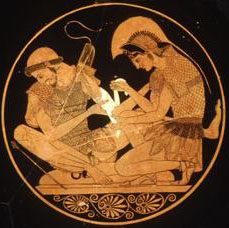![[Loyola University Chicago]](http://www.luc.edu/images/loyola.gif) |
CLST 272-001: Heroes and Classical Epics
|
 |
Fall Semester 2015
Students taking this Tier 2 Literary Knowledge Core course will engage with three cornerstone texts of Classical antiquity - Homer's Iliad and Odyssey, and Vergil's Aeneid - in order to explore how storytelling, mythology, human relations, and transcendent values function within them. Why did ancient Greeks and Romans love these long poems so much? Why did they keep turning to them in order to define what their civilizations were all about? How do the epics operate as literature? What ideas about "being heroic," leadership, community, home, gender, war, travel, loss, victory, and human aspirations do they reflect, and reflect upon, and change? Class meetings will center on collaborative discussion, with occasional forays into creative performance.
Successful students of this course will:
- demonstrate literary knowledge about our three epics:
- know plots and characters, and use this knowledge to develop understanding
- recognize ancient Greek and Roman cultural background - including mythology, storytelling traditions, literary forms, society, and historical concerns - and explain how they help shape the epics
- identify literary techniques, and explain how they form and color the epics
- practice critical thinking in connection with our three epics:
- analyze literary texts and understand how expression gives form to content
- study actions within literary narrative so as to form hypotheses about individual and societal desires, fears, assumptions, and norms that could propel the actions; test and refine hypotheses by logical discussion or creative performance, reformulate, and build understanding
- connect the characters and actions of literary narrative with elements of Classical culture, and consider how our epics reflect and reflect on the societies, technologies, events, understandings, and values of the worlds in which they were composed: practice multidimensional inquiry and integrative analysis
- compare modern assessments of the epics, including our own, with the expectations implied by the texts, and identify how perspectives have changed
Monday - Wednesday - Friday, 8:15am-9:05am
Crown Center 140
Dr. Jacqueline Long
Office Hours:
MWF 9:15am-10:15am, Crown Center 563
or by appointment |
Telecommunication:
773-508-3511
jlong1@luc.edu |
Texts
- Homer, Iliad, tr. Robert Fagles (Viking Penguin)
- Homer, Odyssey, tr. Robert Fagles (Viking Penguin)
- Vergil*, Aeneid, tr. Robert Fagles (Penguin Group)
- * also known as "Virgil" - a medieval pun we can discuss later
Schedule of Reading Assignments and Topics
Policies and Assessment
Performances and Performance-Papers
Additional Resources
|
|
- Perseus Project: an evolving digital library for the study of the Greek and Roman worlds.
- Diotima: a clearing-house of resources on the Internet for the study of women and gender in the ancient world - including much that is relevant to heroes and Classical epic.
- Lacus Curtius, a treasurehouse of on-line resources for just about everything conceivably relating to Roman archaeology, compiled by Bill Thayer.
|

Revised 24 July 2015 by jlong1@luc.edu
http://www.luc.edu/classicalstudies/
![[Loyola University Chicago]](http://www.luc.edu/images/loyola.gif)

![[Loyola University Chicago]](http://www.luc.edu/images/loyola.gif)
